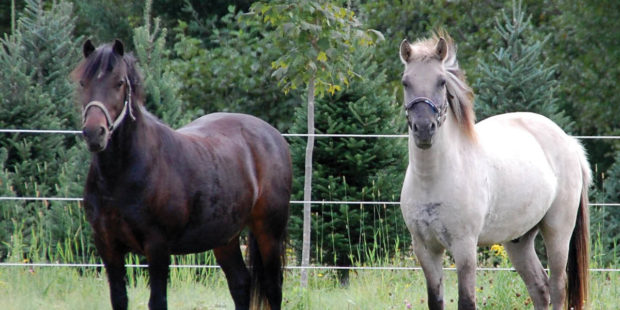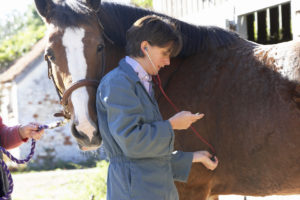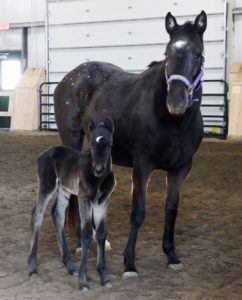
This month we will consider a timely topic for equine welfare, that of vaccinations.
It is time for spring shots here at New England’s premier horse shelter and our equine veterinarians are busy traveling to stables and barns in the area protecting Maine horses against diseases like tetanus, encephalomyelitis, and rabies. Fortunately for responsible horse owners there is little debate about the efficacy of these vaccinations or the small risk of adverse reaction to them. It is also essential for the safety of other horses that all horses receive preventative vaccines, particularly if there is contact between horses not regularly stabled together. For example, if you are planning to take your horse to a fair, show or clinic off-site, you will be required to show proof of current vaccinations as well as a negative Coggins test before your horse will be admitted to the venue of the event.
What is a Coggins test?
 Familiar to most horse owners, the test is diagnostic of Equine Infectious Anemia or EIA. In some circles, the disease is also known as swamp fever. It is caused by a retrovirus and transmitted from animal to animal by blood sucking insects like horse flies and deer flies. EIA is extremely debilitating and may be fatal to horses. Any horse testing positive for EIA must be reported to federal authorities by the testing laboratory. A horse will have the infection for the balance of its life. As a result the horse must be euthanized or branded and sent to a specialized research facility where it can be quarantined for the rest of its life. There are very few such facilities, so in practical terms, a positive Coggins test generally results in euthanasia of the horse.
Familiar to most horse owners, the test is diagnostic of Equine Infectious Anemia or EIA. In some circles, the disease is also known as swamp fever. It is caused by a retrovirus and transmitted from animal to animal by blood sucking insects like horse flies and deer flies. EIA is extremely debilitating and may be fatal to horses. Any horse testing positive for EIA must be reported to federal authorities by the testing laboratory. A horse will have the infection for the balance of its life. As a result the horse must be euthanized or branded and sent to a specialized research facility where it can be quarantined for the rest of its life. There are very few such facilities, so in practical terms, a positive Coggins test generally results in euthanasia of the horse.
Another critical vaccination for horses is that which protects them against the rabies virus.
Sadly, rabies has not yet been eradicated and is 100% fatal for animals who contract the virus. Horses are most often exposed to the virus as a result of contact with infected wild animals like skunks, raccoons or foxes. Rabies, which is generally transmitted through contact with infected saliva or blood, can be transmitted from horses to humans. As an aside, in Maine, although animal welfare law requires domestic cats and dogs to be vaccinated against rabies, it does not require that livestock such as horses receive the same protection. Nonetheless, responsible horse owners include rabies as one of the vaccinations their horses regularly receive.
The list of important vaccinations goes on to include those that guard against West Nile virus, encephalitis, tetanus or lockjaw, and strangles along with others.

Equine veterinarians will work with their clients to set up a schedule of the recommended vaccinations, including boosters for some, in spring and fall that will help keep horses healthy. When you are considering acquiring your own horse, whether you will adopt, lease or purchase, please be sure to obtain a copy of the horse’s vaccination record. If there is no record available, it is best to assume that the horse has not been vaccinated and is at risk for its own health and the health of others, including you.
You are invited to visit the Maine State Society for the Protection of Animals in South Windham and meet the Maine horses who are recovering from abuse and neglect. The shelter is open to the public every day from 1 PM – 4 PM. No admission, plenty of parking, and gorgeous, rehabilitated horses to visit. Please stop in to meet Daphne and her foal; the colt is the first horse born at the horse shelter in more than 20 years. Mark your calendar for Mother’s Day and join us between 1:00 pm – 3:00 pm for a special Mother’s Day reception to honor all mothers, including Daphne.

Meris Bickford, Chief Executive Officer of Maine State Society for the Protection of Animals(MSSPA). Her resume also has experience as an Assistant Attorney General, Bureau Chief for Child and Family Services and Chief Administrative Hearing Officer at Maine’s Department of Human Service.







